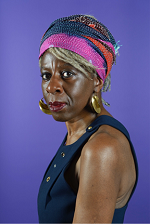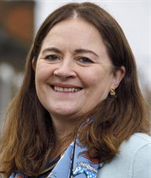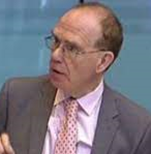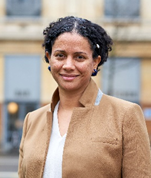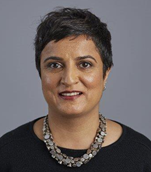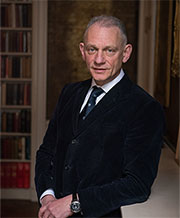View the full list of Commissioners taking part in the Commission on Culture and Local Government.
Baroness Young
Lola Young been an independent Crossbench member of the House of Lords since 2004 and has founded and Co-Chairs All Party Parliamentary Groups on Ethics and Sustainability in Fashion, and Sport, Modern Slavery and Human Rights. Lola has campaigned against discrimination and for diversity and inclusion in the cultural and creative sector, as well as in the criminal justice and care systems. She is Co-Chair of the Foundation for Future London and Chancellor of the University of Nottingham. Current Non-Executive Director roles include Bloomsbury Publishing and Futerra, the sustainability agency.
Andrew Miller
Andrew is a cultural consultant, broadcaster and one of the UK's most influential champions of disabled people. He is a National Council member of Arts Council England, a Governor of the Royal Shakespeare Company, a trustee of BAFTA and chairs the BFI Disability Screen Advisory Group. In 2020 he co-founded the UK Disability Arts Alliance, #WeShallNotBeRemoved and co-authored the Seven Inclusive Principles for cultural recovery. Andrew was the UK Government’s first Disability Champion for Arts & Culture, establishing the role as a powerful campaigning platform for greater inclusion across the arts, museums and film. His pioneering career has been recognised by the The Stage Awards, National Diversity Awards, Disability Power 100 and The Stage 100.
"The LGA Culture Commission has covered broad territory but it has been important to me that we recognised the specific barriers that impact disabled people's participation in culture and the vital role of local authorities to dismantle these. The Seven Inclusive Principles helped shape the UK cultural sector’s recovery from the pandemic and endorsing them is a welcome and important first step. But as this report points out, access to culture is not a fixed point and it requires a continual process of review and renewal by all cultural service providers to ensure no one is excluded."
Bobby Seagull
Bobby Seagull is a school maths teacher, author and TV presenter and came to public prominence after captaining Emmanuel Cambridge on University Challenge. Before moving into education, he was an investment banking trader at Lehman Brothers & Nomura, and is a qualified Chartered Accountant from PwC. He is a charity ambassador for National Numeracy and the Reading Agency and former CILIP Libraries Champion. He is a columnist for the Financial Times, author of The Life-Changing Magic of Numbers and co-presenter of the podcast Maths Appeal. He co-wrote The Monkman & Seagull Quiz Book and co-presents the BBC TV series Monkman & Seagull’s Genius Adventures. He is also quiz host for Channel 4's The Answer Trap.
“As a school teacher and former CILIP libraries champion, I see the value of giving young people the chance to access culture through enriching minds. Libraries stepped up during lockdown helping more people engage with online content. The British Library Business and IP Centres in libraries showed how we can support diverse entrepreneurs of the future.”
Corey Campbell
Corey began his new role as Creative Director of the Belgrade Theatre in January 2022. The appointment sees him carry forward the shared legacy of Strictly Arts Theatre Company of developing a new vision and way of working for a 21st century Theatre, paving the way for greater diversity and positive change in the city’s and the national arts and culture landscape.
Prior to his appointment Corey was Artistic Director of Strictly Arts Theatre Company. Through productions such as Green Leaves Fall and the critically acclaimed, Edinburgh sell-out show Freeman, Strictly Arts used their collaborative, devising process to bring stories from real people to the stage.
Corey’s flagship production for the City of Culture year was a powerful new digital TV series called SeaView. This family drama, with an unsettling supernatural element, is rooted in the experiences of Black, working class communities in the West Midlands. Together with Balisha Karra and Justine Themen, Corey was appointed Co-Artistic Director of the Belgrade Theatre in Coventry for 2021, bringing with him a unique perspective that celebrates Coventry’s diversity and drive for positive change.
Corey’s vision for the Belgrade has been underpinned recently with a significant increase in investment through the Arts Council England NPO Programme.
Derri Burdon
Derri Burdon is the Chief Executive of creative education charity Curious Minds. As the Arts Council England Appointed Bridge organisation for the North West, Curious Minds works to place creativity and culture at the heart of schools and other services for children and young people. Derri originally trained as a teacher and taught English in further education colleges. She went on to work for ten years as part of Bolton Council’s Educational Improvement Service where she was responsible for leading several high-profile education and regeneration initiatives including: Find Your Talent, Inspiring Communities, Bolton UFA and Sunflower Clubs. School wasn’t her favourite place as a child but despite this (or likely because of it) Derri is passionate about improving learning outcomes for all children, especially the most disadvantaged and vulnerable. In her current role, she is driven by the passionate belief that rather than attempting to ‘close the gap’, we should be filling it brim-full with enriching and inspirational cultural and collective experiences that the most fortunate families take for granted. A proud Blackpudlian with Irish roots, she graduated from the University College of St Martin where she studied English Literature and Drama. She is a Governor of a secondary school in Wigan and is Chair of the newly formed CIO ‘Blaze Arts’, as well as Co-Chair of the Cultural Learning Alliance.
Duncan Wilson OBE
Duncan Wilson OBE joined Historic England as the organisation’s first Chief Executive on 1 April 2015. Historic England is a public body which improves people’s lives by protecting and championing the historic environment. Previously, Duncan was Chief Executive of the Alexandra Park and Palace Trust, developing a major regeneration and conservation scheme to restore the Victorian theatre and television studios. Duncan has also been Chief Executive at the Greenwich Foundation for the Old Royal Naval College, maintaining one of Europe's finest groups of baroque buildings, and the Somerset House Trust, opening the site to the public. Duncan’s first job as a chartered accountant in 1987 was as Senior Management Accountant at English Heritage. Before accountancy he worked as a professional archaeologist in Oxford and Herefordshire, following post graduate research in European Archaeology. Duncan is a Trustee of the Chatham Historic Dockyard Trust and the Greenwich Foundation. He is a Fellow of the Society of Antiquaries and an Hon. Fellow of the Royal Institute of British Architects. He was awarded the OBE for services to heritage in 2007.
"The most important aspect of this work for me is that it spells out the link between culture, heritage and place. Heritage is a key component of local identity and belonging, and the Report underlines this, as well as giving good examples of where investment in the historic environment has had beneficial effect on social cohesion, well-being and economic growth. The returns on cooperation between cultural and heritage agencies and local authorities are spelled out. The case studies on High Streets and heritage learning are especially illuminating."
Eilish McGuinness
Chief Executive, The National Lottery Heritage Fund
Eilish McGuinness has worked in heritage all her professional life and has extensive experience across the sector and the breadth of the UK’s heritage. She joined the National Lottery Heritage Fund in 1996 where she has held a variety of roles, both operational and strategic.
Before taking up her current role as CEO in January 2022, Eilish was Executive Director of Business Delivery. Eilish’s department has been among many staff at the Heritage Fund working at the frontline with heritage organisations to support them through the pandemic. From the start of the pandemic, until the end of this financial year, the fund will have invested around £675 million, about £100m more than we would have invested in the same period normally. This has provided vital support to heritage organisations. Eilish has a strong commitment to the power of heritage to support communities, strengthen economies and to change lives. Her work on the Thriving Places hub sets out how the Heritage Fund will support heritage projects that create better places to live, work and visit
Eilish has a degree in History of Art and Archaeology from University College Dublin, and an MA from Queen’s University Belfast, where she was a junior research fellow in the Institute of Irish Studies. She has also worked in the heritage sector in Ireland, Northern Ireland and Scotland.
Hasan Bakhshi MBE
Hasan Bakhshi is Director of the Creative Industries Policy and Evidence Centre, a Nesta-led, AHRC-funded research consortium of ten universities, charged with improving the evidence base for policies to support the UK’s creative industries. His work includes co-authoring the landmark Next Gen skills review of the video games and visual effects industries, which led to wholesale reforms of the school ICT curriculum in England, and the Manifesto for the Creative Economy, which sets out ten recommendations by which governments can help the creative economy grow. Prior to Nesta, Hasan worked as Executive Director at Lehman Brothers, as Deputy Chief Economist at the Foreign and Commonwealth Office and as an economist at the Bank of England. He has published widely in academic journals and policy publications on topics ranging from technological progress and economic growth to the economics of the creative and cultural sector. In the 2015 New Year’s Honours he was awarded an MBE for services to the creative industries. Hasan is a member of the Government’s Creative Industries Council, the Department for Digital, Culture, Media and Sport's Science Advisory Council and Advisory Board for its Culture and Heritage Capital Framework. In 2017, he was elected to sit on the Royal Economic Society Council. He sat on the ABRSM’s Music Commission which published its findings in 2019 and Community and the Fabian Society’s Commission on Workers and Technology which reported in 2020. Hasan currently serves on the board of two arts organisations: Art UK and Darbar Arts.
"The one thing that has stood out most to me in the work of the Commission is the recognition that local investment in culture is best seen as a network phenomenon, with local authorities the central node: connecting, convening and coordinating. The sections I would particularly signposts are Section Three: Barriers, sub-section 6 on Data and Evidence and Section Four: Recommendations. area 8: Evidence."
Professor Katy Shaw
Katy Shaw is Professor of 21st-century writing and publishing at Northumbria University, UK and Director of the UKRI/AHRC Creative Communities programme. Her research interests include diversity and inclusion in the creative industries (the subject of her 2022 TED talk) and the redistribution of the creative industries from the capital to the regions and nations as part of the ‘levelling up agenda’. She is the author of the 2021 APPG Inquiry report ‘The Case for Culture’ that set out policy recommendations, many of which have since been adopted by UK government, on how to rebuild rebalance and recover cultural production post-covid. She brings a focus on R&D, innovation and the role of HEIs and further education in public policy making around culture to the commission.
"The diversity and creativity of the communities we have heard from across the commission evidence has been inspiring and moving. From Carlisle to Cornwall we have seen and heard from individuals, communities and organisations who are tackling some of the biggest challenges facing us all today – education and skills and to health and wellbeing to civic pride and identity – using culture as a vehicle for change making and boundary breaking. Covid created the biggest threat to culture in living memory and our report outlines how we must now respond to the challenge of enhancing resilience, sustainability and support for publicly-funded culture in the years ahead. The way forward is working together: the report outlines some useful new interventions from HEIs like Northumbria in cultural partnership working and in the UKRI/AHRC portfolio including Creative Communities and Culture Heritage Capital that unite cross-sector groups around R&D to engage communities as change makers in that shared journey."
Nathan Geering
Chief Executive, Rationale Method
Nathan specialises in accessibility innovation and strives to make work that heightens accessibility for both disabled and non-disabled artists and audiences. He was the Creative Director of the 2017 Special Olympics Opening Ceremony and is the founder of the multi-award winning Rationale Method of Audio Description. He also runs a registered charity called Rationale Arts that innovates Hip-Hop elements to enhance healthcare in both Medical and Educational settings. Recent years has seen Nathan become a TEDx speaker, published author and multi-award winning film maker. He has featured on BBC television and worked with the likes of Marvel, The National Theatre, The Royal Opera House, Wayne McGregor, British Council and Singapore Repertory Theatre. He continues to implement his work both nationally and internationally to bridge the gap between disabled and non-disabled artists and audiences the world over.
"The one thing that has most stood out to me is the vast amount of great initiatives being implemented across the country that centre the people at the heart of their decision making processes. There are so many examples that clearly demonstrate that this is a powerful way to achieve meaningful impact for LGA and cultural institutions.
I would recommend that section two of the report "Why invest in local culture" and the recommendations that relate to this are observed by local councils, cultural organisations and universities. Particular attention needs to be paid to these points as often local talent and expertise is overlooked which results in huge missed opportunities for both economic and cultural growth......Those who live in our towns and cities have the most expertise on what is needed to achieve meaningful impact."
Sir Nicholas Serota
Sir Nicholas Serota has been Chair of Arts Council England since February 2017 and is a member of the Board of the BBC. He is currently Chair of the Durham Commission on Creativity and Education. Nicholas was Director of Tate between 1988 and 2017. During this period Tate opened Tate St Ives (1993) and Tate Modern (2000 & 2016), redefining the Millbank building as Tate Britain (2000). Tate also developed its national role by creating partnerships with regional galleries across the UK in the Plus Tate network. Between 2008 and 2017 he led the work on ‘Greening Museums’ for the Bizot Group of international museums.
“Local government is the Arts Council’s most important strategic and delivery partner, so it’s been inspiring to hear from colleagues working within and alongside councils about the crucial importance of local leadership to our shared cultural life. It’s been a powerful and encouraging restatement of the importance of local government."
“Culture makes a difference to people’s lives locally when there is support for its development and a desire to build ambition. Cultural compacts are already providing capacity for this by bringing together partners in the community. The Commission has recognised their value and has made practical recommendations about how they can be even more effective.”
Councillor Peter Golds CBE
Deputy Chair of LGA Culture, Tourism and Sport Board
Councillor Peter Golds CBE has served as a London councillor for twenty four years, including sixteen years on Tower Hamlets Council, where he is Leader of the Conservative Group. He has been active on London Councils as well as the LGA. For eight years Peter has been a member of the Culture Tourism and Sports (CTS) Board at the LGA, currently serving as Deputy Chair. He will be representing the CTS Board on the commission and ensuring that the work of the board and the LGA is reflected. He has a lifelong interest in the arts and sport and in particular music, opera and the theatre and sits on the Board of Directors of the Green Candle Dance Company. He is also closely involved in local work on sports development and is a Director of the Island Sports Trust, a voluntary organisation which manages and facilities community use of sporting facilities and sports development for young people. Peter grew up in a non-prosperous area of London and is committed to ensuring the arts and sport are there for all.
Petra Roberts
Petra Roberts is the Strategic Service Head for Culture, Heritage, and Libraries at Hackney Council.
Petra leads a major change programme across Hackney’s Libraries Service, which is the first formal library review for several years that will inform a new Library strategy in 2022.
During the Covid lockdown, Petra provided business and fundraising support to local arts organisations at risk. She also led the Mayor’s heritage review into the naming of landmarks, streets and public spaces in response to the resurgence of the Black Lives Matter movement.
In 2018, Petra initiated an award-winning cohesion programme and a philanthropic legacy project that has seen the installation of the first permanent sculptures to honour the Windrush generation in Hackney.
Previously to local government, Petra worked in various roles in the voluntary and community sector, the cultural and creative industries, the National Health Service and as a grant maker at the National Lottery Fund.
"The Commission brought together cultural leaders with diverse skills and experiences that facilitated knowledge exchange and a deeper understanding of the challenges faced. This served to underline that positive change will only come about through collaboration and that there will need to be a coordinated response at local, regional, and national levels. The report emphasises the significance of place-led models and that collaboration leads to greater impact. We must review how our cultural investment is delivering for local people today, as well as how we can strengthen the cultural ecosystems for tomorrow."
Samantha Richardson MBE
Academy Director, National Coastal Tourism Academy
Samantha Richardson MBE has directed the research, visitor experience, training and communications programmes of the Academy since its launch in 2013. She also oversees the “England’s Coast” project, which focuses on attracting new international and domestic visitors to our stunning coastline year-round.
Sam’s work focuses on national engagement and partnerships that will help boost the visitor economies of coastal communities, with a particular emphasis on addressing seasonality and raising awareness of key issues impacting coastal tourism in England.
Sam has a postgraduate degree in Tourism Management and over 20 year’s experience in the industry. Samantha was awarded an MBE in the New Year’s Honours List in 2022 in recognition for services to England’s coastal tourism and supporting destinations through the pandemic.
"Culture is a critical part of our visitor economy, it’s what makes a destination come alive, celebrating the uniqueness of a place and its people and driving a year-round offer that is so crucial to the future success of many coastal communities. Identifying the key indicators for success and sharing best practice, what has stood out for me is the passion and commitment of each of the case studies, and the importance of working together to deliver a vision that works for “this place”. Now more than ever the work of the commission highlights the need to continue to work collaboratively to unlock creative potential and ensure we have vibrant and inclusive places for future generations to live, work and visit."
Sara Wajid MBE
Sara Wajid MBE is Co-CEO of Birmingham Museums Trust, alongside Zak Mensah – this job-share CEO partnership is a first in the museum sector and signals Birmingham Museum Trust’s commitment to inclusive working practices. Sara was formerly Head of Engagement at Museum of London and Head of Interpretation at Birmingham Museum and Art Gallery in 2017. Before working in museums, Sara was a cultural commentator, journalist and editor. She is a trustee of the Pitt Rivers Museum, a judge of the Museum Activism award, a member of the Museum Detox network for people of colour in museums and an active advocate for diversity and equality issues in the arts.
Val Birchall
Val Birchall is past Chair of the Chief Culture & Leisure Officers Association (CLOA). She is the association’s Equality Champion, driving towards a more diverse and inclusive leadership model in the sector. Val has led culture, tourism, events and sport services in local government for nearly two decades, working at Birmingham, Brighton & Hove and Coventry City Councils and has experience running services ranging from communications to the creative industries, digital, community development and sustainability. She was an Expert City Coach for the European Commission’s Culture for Cities and Regions programme and has worked as a consultant and lecturer in cultural policy. Val is a Fellow of the Royal Society of the Arts and on the board of Talking Birds Theatre Company. She is currently researching into the implications for cultural policy makers of emerging experimental models of local governance.
"The most important aspect of the work of the Commission for me has been the acknowledgement of the distinctive nature of individual places - their assets, their networks, their leadership and their needs, all of which need to be taken into account in developing new interventions so that they are genuinely of the place. I would point councils to the recommendations under point six - the critical importance of increasing the range of perspectives brought to cultural partnerships and strategies, and to expand the capacity and diversity of local cultural leadership."
Veda Harrison
Veda Harrison is Director of Creative Confident Communities/ A Fairer Future at the Esmee Fairbairn Foundation. She has worked extensively in the cultural, community and corporate sector, including with the Money and Pension Service on vulnerability, gender and racialised communities’ economic equality and financial wellbeing and more. Some of Veda's other work includes at NatWest Group in Sustainability and Corporate Affairs, leading engagement with charity partners, with the Stephen Lawrence Charitable Trust, NESTA and UK Youth, leading programmes on young people's creative and cultural development across the UK, at the Royal Borough of Greenwich/Charlton Athletic Race Equality Partnership designing and delivering community cohesion initiatives, and with the Southbank Centre Participation team and London International Festival of Theatre (LIFT). She is Vice Chair of Tramshed Arts in Woolwich and Fellow of the RSA.
"What has been most important to me in the work of the Commission is the opportunity to work collaboratively across the cultural sector and civil society and utilise the experience the commissioners and input from those who work and continue to deliver great work across the England. Given the current climate – socially and economically - the scale of the challenge is immense but there is momentum and expertise from contributors to make a real difference with the recommendations of the report. Trusts and foundations have and will continue to play an important role in catalysing creative change in place and the learning we generate though our independent funding enables places to lead this change and better reflect the needs of the communities."
Lord Neil Mendoza: adviser
Neil Mendoza is Commissioner for Cultural Recovery and Renewal and Provost of Oriel College, Oxford University.
In 2017 he led two government reviews, ‘The Mendoza Review: an independent review of museums in England’ and a separate tailored review of the museums sponsored by DCMS.
He started working life as a banker at JP Morgan in New York before moving to film finance. He co-founded the pioneering publishing agency, Forward, later sold to WPP. He has spent much of his career as an entrepreneur in a number of industry sectors including film, design, marketing and technology. He is a publishing consultant to watch company, Patek Philippe.
Neil is on the board of Meira GTx, a gene therapeutics company, listed on Nasdaq. He was Chair of The Landmark Trust for ten years and is now Chair of Civic Future and the Illuminated River Foundation.
Lord Neil Mendoza is acting as Advisor to the Commission on Culture and Local Government. In this role he will meet the Chair at key milestones in the project to discuss its programme of work and findings, allowing the commission to draw on his extensive experience of championing the arts and culture and insights into the Government’s priorities in relation to levelling up, recovery and renewal.

